Bhutanese enjoy the hardest cheese in the world like chewing gums
The Bhutanese love their cheese. They even have one that’s arguably the hardest in the world.
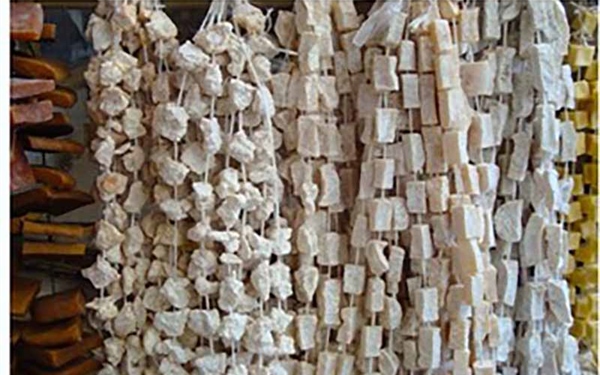
The Bhutanese consume a lot of dairy. This is no surprise because Bhutan is cold, and dairy provides the warmth and strength necessary for survival.
Besides, the high altitude and closed economy makes it viable for rearing cows, yaks, sheep, and goats; livestock that provide dairy products.
But of all that dairy, there is one product that rules them all... cheese!
As a matter of fact, a Bhutanese experience is not complete without tasting their cheese.
Cheese in Bhutanese cuisine
The local term for cheese is datshi. Bhutanese love datshi in their cooking, from curries to tea and everything in between.
In fact, the national dish of Bhutan, Ema Datshi, is a spicy mix of chilies and datshi. This dish is a staple and can be found throughout the country. There are many variations of Ema Datshi that could include green beans, ferns, potatoes, or mushrooms.
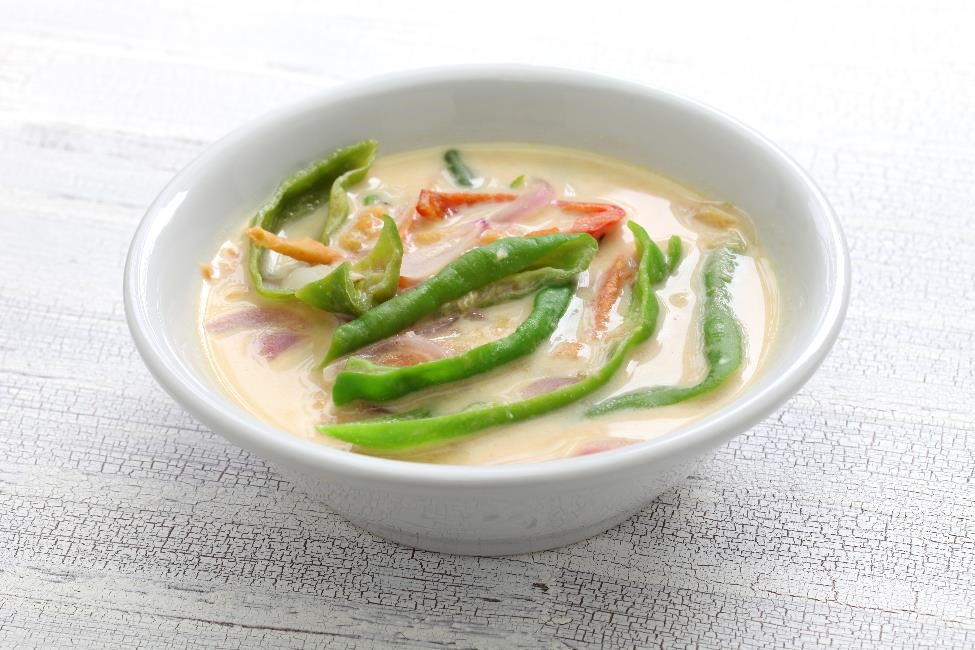
Ema datshi
To make datshi, cold milk and water is added into a bucket.
The mixture is churned for 30 minutes until fresh yellow butter rises to the top.
The leftover buttermilk is then mixed with hot water and left to sit for 5 to 10 minutes. Soon, the datshi sinks to the bottom.
For those living in the mountains, it is a good source of protein, as well as a substitute for vegetables.
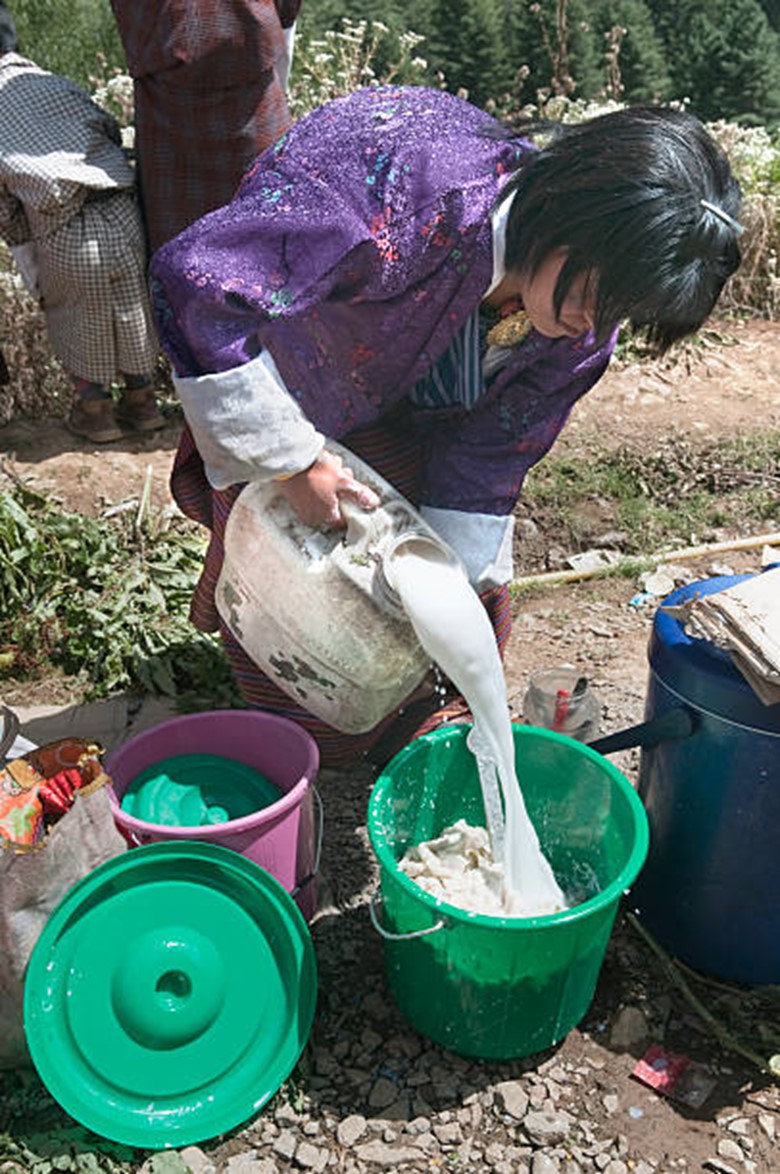
A woman making datshi.
Chugo, arguably the hardest cheese in the world
On another note, when you see the locals randomly chewing as they go about their daily lives, they are likely either munching on doma (betel nut), or gnashing on chugo.
Chugo, also known as chhurpi, is a type of hardened cheese popular in Bhutan.
It is made of yak’s milk.
You can find these hanging from strings in stores and marketplaces.
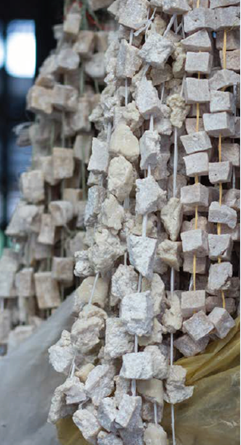
Apparently, in America, chugo is sold as special dog treats called “Himalayan Dog Chew''. A packet of 3 pieces can cost 50 USD. In Bhutan, it’s Nu. 70 (0.93 USD) a packet.
It seems like one man’s dog treats is another man’s feast, because in Bhutan, chugos are crazy popular, especially in the less-developed towns.
Chewing it early in the morning helps them keep warm. It is an acquired taste though.
It smells like yak—which might or might not be a desired trait in food—and is so hard that it takes 30 minutes to gnaw through.
It is arguably known as the hardest cheese in the world.
One western tourist commented that she had the cheese in her mouth for ages during a long car ride through the Himalayas before it started to soften. She couldn’t bite into it at all until the cheese started to dissolve, which took a long time.
However, in spite of what foreigners think, chugo is to the Bhutanese what one might think of chewing gum. They suck on it as they live through their day, just for fun.
Having said that, one place with a slightly different version of chugo is Haa town, where the chugo is known as Haabey Ruto. Haabey Ruto does not have sugar, and is thus not sweet like those found in Bumthang and other parts of the country.
How is chugo made?
Making chugo is an onerous process.
First, raw milk is fermented in a warm area. Over a few days, fresh milk is added to the fermented one.
When the milk coagulates, it is churned in a cowhide container. This is done to separate the butter from the rest of the milk.
The liquid milk is poured into a bronze pot and brought to a boil over a stove while it is stirred occasionally.
The stirring is important because it is what yields the cheese.
Next, the cheese is wrapped in coarse yak cloth and sandwiched between two flat stones to squeeze out all the water.
After that, the cheese is sliced and strung with yak hair, then smoked over a fire.
Other cheese in Bhutan
Another cheese worth mentioning is Zetay (fermented) cheese.
This is used in cooking, like with the beef jerky below, adding extra taste to the dish.
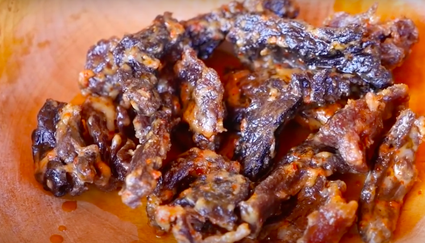
Beef jerky with fermented yak cheese
Other than traditional Bhutanese cheese, swiss cheese is also available in Bhutan at the Bumthang Brewery and Cheese Factory. As the name suggests, it is both a brewery and a cheese factory; the two buildings are located side by side.
The place was founded by Fritz Maurer, a Swiss national who married a Bhutanese.
This cheese factory is the only commercial one in Bhutan. They produce an assortment of swiss cheeses, and you might even set eyes on the biggest cheese you’ve ever seen in your life!
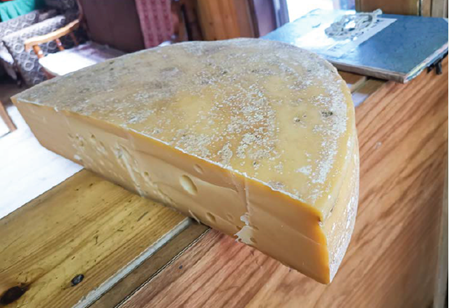
A giant cheese
In recent years, the need for dairy products in Bhutan has reduced
Thanks to global warming, the Bhutanese don’t need as much dairy to keep warm. Similarly, due to development, they don’t need the kind of energy that their labourer forefathers needed.
Over time, this might have some gradual bearing on Bhutanese cuisine. Maybe one day, dairy won’t be a staple in Bhutanese food the way it is today.
But in the meantime, from the looks of it, cheese is here to stay, and will continue to be for a very long time.




